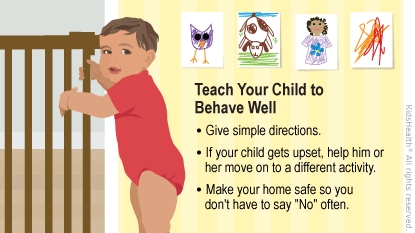Temper Tantrums: How to Care for Your Child
Temper tantrums are a normal part of a child's development and usually happen less often as they get older. During a temper tantrum, a child may whine, cry, scream, kick, hit, or hold their breath. Temper tantrums usually happen when kids are 1–3 years old. You can help your child learn how to deal with strong feelings that can lead to temper tantrums.


To help prevent tantrums:
-
Keep a regular routine so your child knows what to expect.
-
Make sure your child gets enough sleep.
-
Make sure there is time every day for active play and exercise.
-
Try not to plan activities at times when your child might be tired or hungry.
-
If a temper tantrum is about to start, try distractions like taking your child to a different room or changing the activity. Sometimes a silly song or a gentle tickle can help change the mood.
-
Be consistent about discipline:
-
Give short and simple directions and explanations. Tell your child what to do rather than what not to do. For example, say, "Use a quiet voice" instead of "Stop yelling."
-
Give choices when you can. For example, "Do you want to wear the red shirt or the blue shirt?"
-
Reward wanted behaviors with specific praise. For example, say, "I really like the way you put the blocks away" instead of "Good job."
-
When unwanted behaviors happen, be ready to help your child move on to a different activity.
-
Make your home and yard safe so you don't have to say "No" often.
-
Never hit, shake, or spank your child.
When your child has a tantrum:
-
Try calmly ignoring your child until they are quiet for a few seconds. Stay close by so you can make sure your child stays safe.
-
Do not give in to your child's demands during a tantrum.
-
If your child is in a fun setting during a tantrum (for example, at a playground or birthday party), take your child away from it to calm down. Then, tell your child, "I would be happy to take you back once you get control."
-
Do not ignore hitting or biting. Gently hold your child. Say, "I can't let you do that. I'll wait right here with you while you calm down." Wait patiently for your child to calm down and stop hitting or biting.
-
After your child calms down, comfort them with a hug and praise. You can say, "I like the way you got control of your feelings."

-
The tantrums don't improve, or they get longer, more frequent, or more intense.
-
Your child is hitting or biting often.
-
You are having trouble coping with your child's tantrums or worry you might hit or hurt your child.

Why do tantrums happen? Tantrums happen when children are overwhelmed by strong feelings. They may feel angry, sad, or annoyed. Or they may be disappointed that they can't have what they want. They might not have the language skills to explain what they feel, and this can be even more frustrating. Sometimes kids use tantrums to try to get what they want, especially if this worked for them in the past.